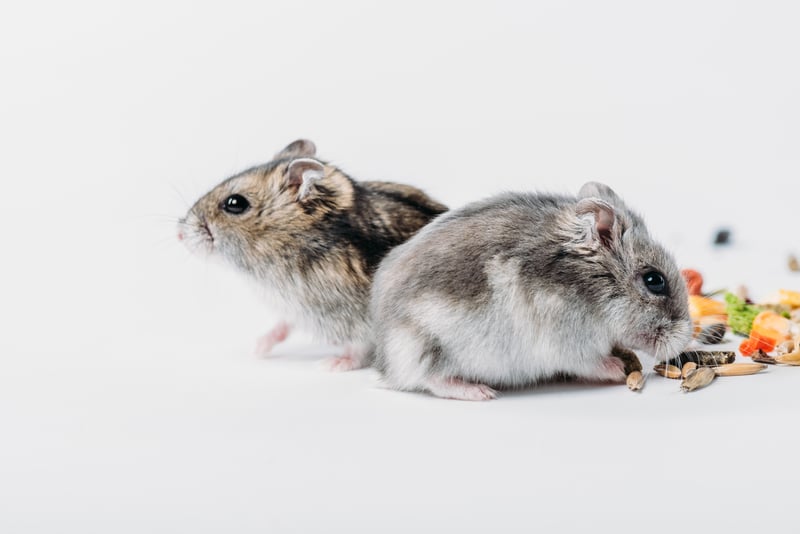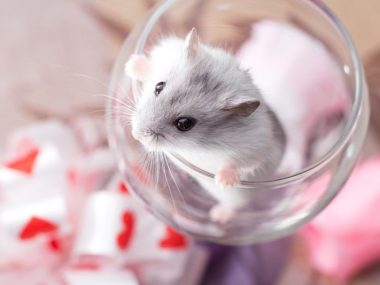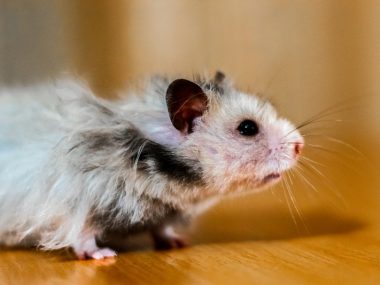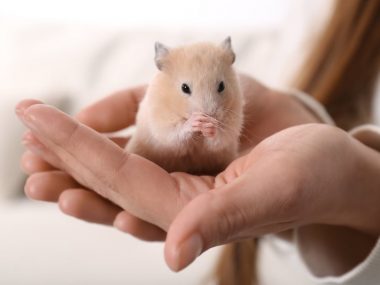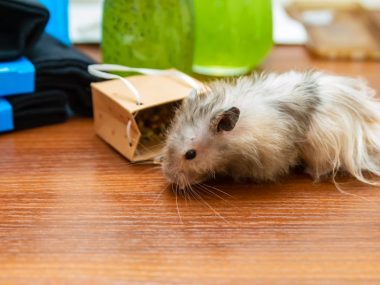Hamsters are often promoted as low-maintenance animals. However, low maintenance does not mean no-maintenance. To stay healthy, hamsters need a constant supply of fresh food. A healthy feeding schedule should account for your hamster’s natural sleep-wake cycles, physical condition, and need for enrichment.
Hamsters should be given fresh food and water every day. The best time to feed your hamster is during or shortly after sundown, i.e., 6:00 pm to 9:00 pm. Treats can be provided 1 to 2 times per week depending on your hamster’s body conditions, health, age, and pregnancy status.
Animals thrive on predictability, and your hamster is no different. Feeding your hamster according to a healthy feeding schedule is one of the golden rules underpinning good hamster husbandry.
Table of Contents
When And How Often Do You Need To Feed A Hamster?
Biorhythms govern all mammals. Biorhythms are the patterns or schedules animals (including humans) adopt and modify depending on their circadian rhythms, predator threats, temperature, light exposure, and food availability.
The healthiest feeding schedules are those which fit in with your hamster’s natural biorhythms. Because hamsters are nocturnal animals, it makes sense that the best time to feed them is during the early hours of the evening.
Filling your hamster’s bowl with food during the evening hours means that:
- Your hamster’s food will still be fresh when they wake up.
- You get a chance to have fun with your hamster when feeding them.
- Your hamster has all night to eat.
The best time to give your hamster fresh food is 6:00 pm to 9:00 pm, during or just after sundown.
| Food Type | Frequency Of Feeding |
| Balanced hamster pellet | Every day |
| Seeds | 2 -5 x per week, depending on your hamster’s weight |
| Vegetable treats | 1-2 x per week |
| Protein treats | 1-2 x per week |
| Insects | 2-6 x per week |
| Fruit treats | 1 x per week |
| Commercial hamster treats | 1-2 x per month |
Do I Need To Add Treats To My Hamster’s Feeding Schedule?
Treats are considered an added extra, i.e., your hamster does not need edible treats to stay healthy. Although treats are not essential, they are a fun way to spoil your hamster!
Treats help break up the monotony of a pelleted diet, and many hamster owners use treats to enrich their hamster’s life.
It’s essential to track when and what treats you have given your hamster to avoid accidentally overfeeding your hamster. Hamsters, as a species, are vulnerable to diabetes and obesity, so their diets must be carefully monitored to prevent overindulgence and unhealthy eating habits.
Why Is A Hamster Feeding Schedule Important?
Your hamster’s feeding schedule is inextricably linked to their biorhythms through a gene called a rhythmic clock gene.
The rhythmic clock gene creates a bidirectional relationship between the hamster’s sleep cycle and eating schedule. A more straightforward way of saying this is when you feed your hamster influences their resting behavior, and their rest period influences when they eat.
Hamsters fed during the morning hours develop abnormal eating patterns and will often have disrupted rest; these hamsters will fall asleep when other hamsters are waking up.
The abnormal rest patterns seen in morning-fed hamsters have negative consequences, similar to those seen in night-shift workers.
A night-shift worker technically has the same number of sleep hours as a day-shift worker. However, these sleep hours are not synced with the person’s circadian rhythms resulting in adverse health consequences, e.g., abnormal eating patterns, obesity, depression, etc.
Hamsters who are “tricked” into sleeping at night will be more stressed and less healthy than hamsters who are fed in the evening and sleep during the day.
How Much Can A Hamster Eat?
Hamsters are foragers and typically eat small meals often. The average hamster will eat approximately every 2 hours and consume 8 to 12 grams of food per 100 grams body weight per day. The formula “translates” to 0.3 to 0.42 oz of food per 3.5 oz body weight per day.
0.42 oz of food per 3.5 oz of body weight means an average Syrian hamster weighing 5.3 oz will require 0.63 oz of pelleted food per day. In comparison, a large Syrian hamster weighing 8 oz will need approximately 0.9 oz of pelleted food per day.
When calculating food quantities for healthy adult hamsters, the calculations must be based on the difference between your hamster’s ideal weight and their current weight.
If you are unsure what your hamster’s perfect weight is, ask your veterinarian to give you a goal weight based on your hamster’s current body condition.
Pregnant, lactating, sick, and underweight hamsters need more food than a healthy adult hamster. Young and growing hamsters will need to be fed more per 100 grams of body weight to ensure that a lack of nutrition does not stunt their growth and development.
Overweight hamsters will need to be fed less until they reach a healthy weight. Always speak to your veterinarian before putting your hamster on a diet.
Hamsters should not go more than 16 hours without food and should ideally have access to a continual supply of fresh food during their “alert” hours.
What Can Hamster’s Eat?
Hamsters eat seeds, berries, roots, grains, and various plants in the wild. It can be challenging recreating a wild hamster’s diet for domestic hamsters. Thus the Louisiana Veterinary Medical Association recommends that the bulk of a pet hamster’s diet consist of a commercially produced balanced pellet.
Ideally, a hamster’s diet should consist of approximately 16% protein and 4-5% fat. A protein-deficient diet will cause alopecia (i.e., hair loss), while a fat-heavy diet (more than 7-9%) can be fatal for your hamster.
A balanced diet not only keeps your hamster healthy but can extend their life by years!
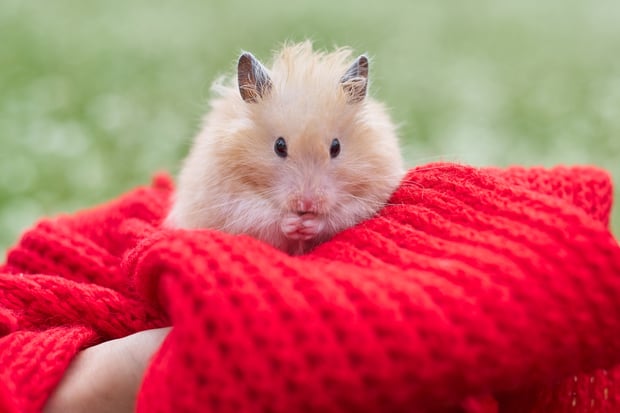
How Do Hamsters Let Their Owners Know They Are Hungry?
Hamsters who are predictably fed during the evening hours will show food anticipatory activity (FAA). By contrast, hamsters fed during the daylight hours do not engage in FAA.
As your hamster gets familiar with a predictable feeding schedule, they will begin to display FAA. If you reliably feed your hamster at 8:00 pm, your hamster will become more active 1 to 2 hours before receiving their food.
The excited hamster will begin exploring their cage, washing their face, and may hop onto their wheel for a quick pre-meal exercise.
Well-fed hamsters will eagerly greet the arrival of their dinner but will not be unduly aggressive.
Food-deprived hamsters may become aggressive or lethargic. An aggressive hamster may growl or attempt to bite, whereas a lethargic hamster will be difficult to rouse and show little interest in their environment.
Hamsters receiving insufficient daily calories will lose weight and, in extreme cases, die from starvation.
How Often Should You Change Your Hamster’s Water?
Hamsters need a daily supply of fresh water. You should always provide your hamster with more water than necessary. Unlike with food, hamsters won’t overindulge and drink too much water.
Hamsters drink on average 10 ml of water per 100 grams of body weight per day, i.e., 2 US tablespoons per 3.5 oz of body weight per day. However, to ensure your hamster always has enough water, aim to give them 6 to 10 US tablespoons of water per day.
Conclusion
When feeding a hamster, it is imperative to consider your hamster’s needs and not just “fit them in” when convenient.
The healthiest feeding schedules should:
- Fit in with your hamster’s biorhythms, i.e., feed them during the evening hours.
- Provide them with adequate quantities of food; a hamster should never go more than 16 hours without food and should ideally have access to a continual supply of fresh food.
- Consists of a balanced diet with weekly snacks used for enrichment.
